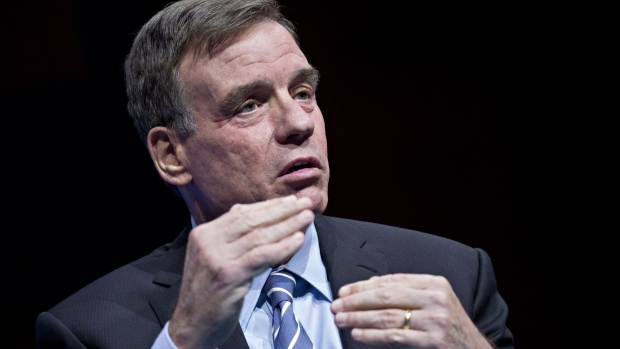Mar 20, 2023
US Lawmaker Divisions Over FDIC Cap Threaten Action on Failing Banks
, Bloomberg News

(Bloomberg) -- House conservatives said they would oppose any universal guarantee of bank deposits above the current $250,000 FDIC insurance cap, even as other lawmakers said they’re weighing a statutory increase in the limit following two recent bank collapses.
The House Freedom Caucus’s position complicates any congressional effort to raise the Federal Deposit Insurance Corporation limit on deposit insurance. Republicans control the House with just a four-seat majority, and the bloc of about two dozen populist representatives holds significant sway over House Speaker Kevin McCarthy and his leadership team.
“Any universal guarantee on all bank deposits, whether implicit or explicit, enshrines a dangerous precedent that simply encourages future irresponsible behavior to be paid for by those not involved who followed the rules,” the Freedom Caucus said in a statement. The group also said the US Federal Reserve should phase out its new lending program that aided Silicon Valley Bank and Signature Bank “as soon as possible.”
Their call came as Senator Mark Warner, a Virginia Democrat, said he is “open” to an idea put forth by mid-sized banks to extend FDIC insurance to deposits of all sizes for the next two years, but he isn’t in a hurry to do so.
Warner, a member of the Banking Committee, said he remains concerned that lifting the current $250,000 cap on deposit insurance could encourage unwarranted risk-taking and doesn’t “want to rush because to take that leap is a big leap.” At the same time, he said expanded deposit insurance could stave off consolidation in the banking industry that could eliminate some mid-size banks.
Republican Representative Andy Barr of Kentucky, chair of the House Financial Services Subcommittee on Financial Institutions and Monetary Policy, said Monday that he’s “still gauging” support among House Republicans for raising deposit insurance caps while adding that insuring 100% of all deposits “is not warranted.”
Hours later, Republican leaders, who are gathered this week at a retreat in Orlando, seemed to heed the call from conservatives by pushing for more oversight.
“We don’t need more statutes or regulations. We need better and more active supervision,” Arkansas Republican French Hill, the vice chairman of the House Financial Services Committee, told reporters. Hill said he wouldn’t support changing deposit insurance unless the Treasury Department and FDIC recommended it.
Another Republican, Blaine Luetkemeyer of Missouri, opened the door to guaranteeing all deposits for 30 to 60 days, saying that could “add to the calm of the situation.” But Luetkemeyer, a 30-year veteran of the banking industry, was non-committal.
“Regulators have taken action,” Luetkemeyer said. “I think that actually may be enough. But we’ll we’ll have to see.”
The collapse this month of Silicon Valley Bank and Signature Bank triggered a rush of deposits out of regional lenders and into the nation’s largest banks. Customers worried by the bank failures took refuge in institutions seen as too big to fail.
The 2008 Dodd-Frank law set the current $250,000 deposit cap, and while Congress has the power to raise it again, it’s not yet clear if legislation doing so can pass.
President Joe Biden’s administration could theoretically act on its own but faces legal obstacles.
Treasury Secretary Janet Yellen testified under questioning from Republican James Lankford of Oklahoma last week that the unlimited FDIC backstop approved for Silicon Valley Bank and Signature Bank depositors didn’t apply to other banks.
Yellen said a bank “only gets that treatment” if supermajorities of the FDIC and the Federal Reserve boards and Yellen in consultation with the president “determine that the failure to protect uninsured depositors would create systemic risk.”
Lankford and other lawmakers have been concerned that large depositors are leaving their local banks for the perceived safety of larger institutions.
Senators who have talked up raising the FDIC insurance cap include Republicans Mitt Romney of Utah and Mike Rounds of South Dakota and Democrat Elizabeth Warren of Massachusetts.
Warner, who spoke at a breakfast Monday with reporters sponsored by the Christian Science Monitor, said he was also “wide open” to other changes in banking rules, despite his support for a 2018 law that relaxed regulations on mid-size banks that some Democrats are now blaming for the banking crisis.
He said that he would support any efforts by regulators to claw back bonuses that executives received before their banks failed and is examining legislation other senators have proposed to mandate compensation clawbacks.
The Mid-Size Bank Coalition of America, which includes banks with assets as much as $100 billion, asked regulators to lift the current cap on deposit insurance, according to a letter seen by Bloomberg.
“Notwithstanding the overall health and safety of the banking industry, confidence has been eroded in all but the largest banks,” the group said in the letter to regulators, which added that the flight of depositors from regional banks would accelerate if another one fails.
--With assistance from Gillian Tan and Steven T. Dennis.
(Updates with comments from Republicans, starting in seventh paragraph.)
©2023 Bloomberg L.P.






